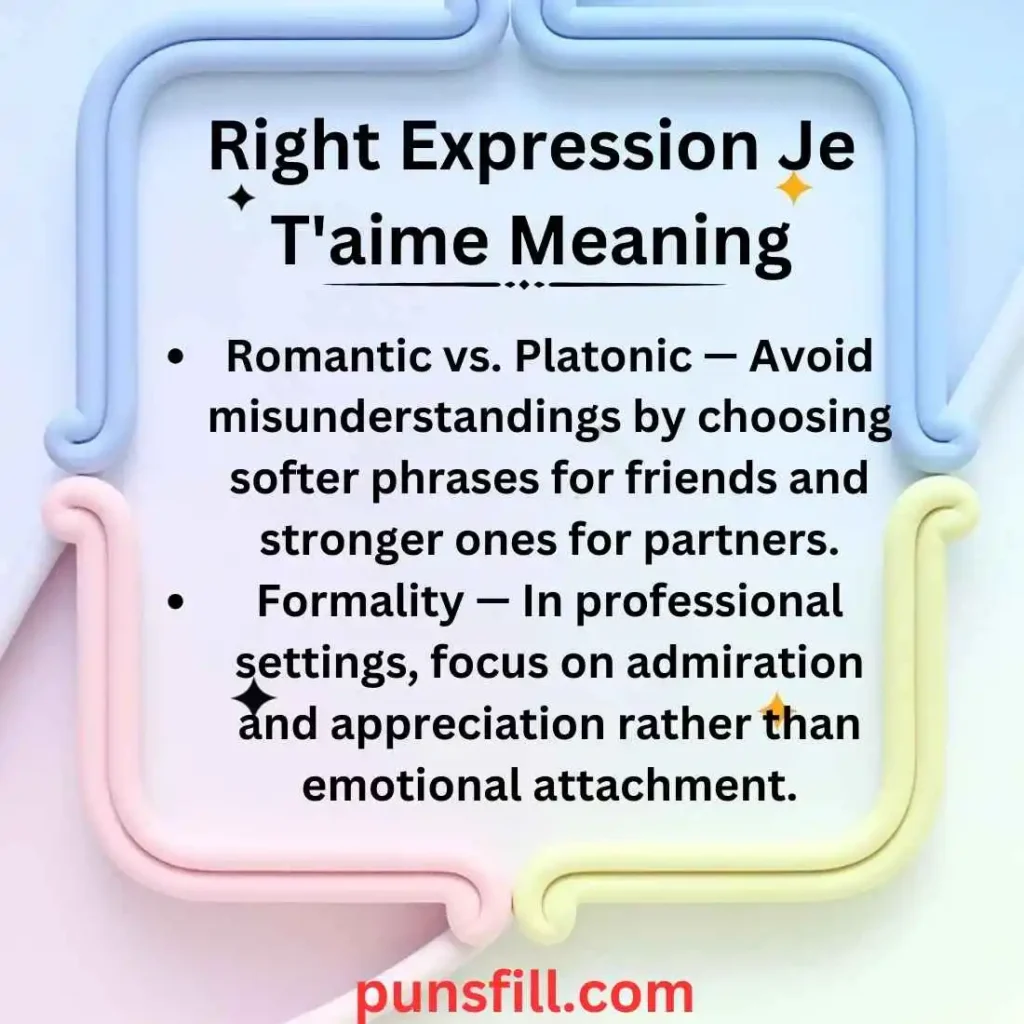Last Updated on February 20, 2025 by Ethan Richards
The French phrase “je t’aime” holds a timeless allure, evoking emotions of love and deep affection.
Translated directly into English, it simply means “I love you.” Yet, as with many expressions of the heart, the meaning behind “je t’aime” extends beyond the words themselves.
This article dives into the essence of this romantic phrase, offering nuanced interpretations and presenting polite, professional, and casual alternatives.
The Meaning and Context of “Je T’aime”
At its core, “je t’aime” conveys love, but the way it is received can depend heavily on context. In French, it can imply romantic love, familial love, or deep friendship.
Unlike English, where “I love you” might feel quite direct or intimate, “je t’aime” carries a softness, making it versatile yet profound.
Romantic Use
When spoken to a partner, “je t’aime” signifies deep emotional and physical affection. It is used in dating, relationships, and marriages to express heartfelt love.
Familial and Platonic Use
In familial or friendly contexts, “je t’aime” may sometimes be considered too strong, so variations like “je t’aime bien” (I like you) or “je t’adore” (I adore you) are more commonly used.
Polite Alternatives to “Je T’aime”

When communicating love or appreciation without the intensity of romantic undertones, these polite alternatives can be useful.
- Je t’aime bien — I like you (friendly, casual).
- Je t’adore — I adore you (warm but less intense than “je t’aime”).
- Tu me plais — I like you (romantic interest without heavy commitment).
- Je suis attaché(e) à toi — I’m attached to you (intimate but not overwhelming).
Professional Alternatives to “Je T’aime”
In professional contexts, expressing admiration or appreciation requires a careful balance to avoid crossing boundaries.
- J’apprécie beaucoup ce que vous faites — I really appreciate what you do.
- Je vous estime beaucoup — I hold you in high regard.
- Votre travail me touche — Your work moves me.
- Je suis impressionné(e) par vous — I am impressed by you.
Casual Alternatives to “Je T’aime”
For friends and casual conversations, lighter expressions help maintain warmth without overstepping.
- T’es génial(e) — You’re awesome.
- Je kiffe trop — I’m shocking about you (very informal, youthful slang).
- On est bien ensemble — We vibe well together.
- T’es mon/ma pote préféré(e) — You’re my favorite buddy.
Choosing the Right Expression

Deciding how to express affection in French requires attention to the relationship’s nature and the context. Consider these factors:
- Romantic vs. Platonic — Avoid misunderstandings by choosing softer phrases for friends and stronger ones for partners.
- Formality — In professional settings, focus on admiration and appreciation rather than emotional attachment.
- Cultural Nuance — French communication often values subtlety; an overt declaration of love might be perceived differently than in English-speaking cultures.
Texting Examples with “Je T’aime” and Its Alternatives
- Je t’aime tellement, tu me rends heureux/heureuse chaque jour. (I love you so much, you make me happy every day.)
- Je t’adore, tu es incroyable ! (I adore you, you are incredible!)
- Je pense à toi tout le temps, tu me manques. (I think of you all the time, I miss you.)
- T’es le meilleur / la meilleure, je t’aime bien ! (You’re the best, I really like you!)
- Je suis fou/folle de toi. (I’m shocking about you.)
- On est une équipe de choc, je t’apprécie tellement ! (We’re a great team, I really appreciate you!)
- Je kiffe grave, t’es top ! (I’m totally into you, you’re awesome!)
- Merci pour tout, je te porte dans mon cœur. (Thank you for everything, I hold you in my heart.)
- Je suis touché(e) par ta gentillesse. (I’m touched by your kindness.)
- Je t’aime à la folie ! (I love you like shocking!)
Conclusion
Understanding the meaning of “je t’aime” and its alternatives offers a richer way to connect with others in French.
Whether in romantic, familial, professional, or casual contexts, knowing how to adjust your wording can make all the difference.
Embrace the beauty of this iconic phrase and use it with authenticity and care!
By exploring these nuances, you’ll not only enhance your language skills but also deepen your cultural appreciation. So go ahead—say “je t’aime” or find the perfect alternative, and watch the magic unfold.

James Wilson is a renowned biblical scholar and dream expert, dedicated to exploring the spiritual dimensions of dreams. His in-depth knowledge and compassionate approach provide readers with valuable tools to understand and embrace the divine messages revealed in their dreams.










